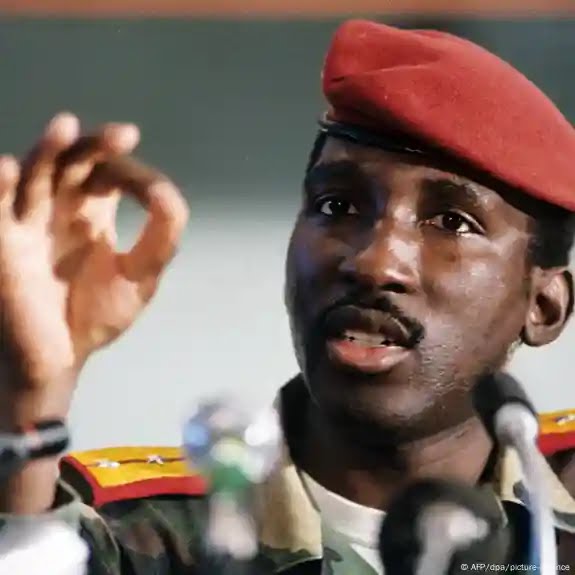
Thomas Sankara (born December 21, 1949, Yako, Upper Volta [now Burkina Faso]—died October 15, 1987, Ouagadougou, Burkina Faso) was a military commander and Pan-Africanist who was appointed as President of Upper Volta (later Burkina Faso) in 1983 following a military coup. He retained the role until 1987, when he was assassinated during another coup.
Sankara’s Roman Catholic parents wanted him to become a priest, but he chose a military career instead. At the age of 20, Sankara was sent to Madagascar for officer training, where he observed a popular student and worker movement that succeeded in deposing Madagascar’s president. Before returning to Upper Volta in 1972, Sankara attended a parachute academy in France, where he was exposed to more left-wing political beliefs. He received a lot of notoriety in 1974 for his heroic conduct in the border conflict with Mali, but he later renounced the war as futile and unjust.

A succession of labor union strikes and military coups shook Burkina Faso in the early 1980s. Sankara’s military achievements and charismatic leadership style made him a popular candidate for political jobs, but his personal and political integrity clashed with the leadership of the successive military administrations that came to power, resulting in his detention on multiple occasions. In January 1983, Sankara was chosen as the prime minister of the newly established Council for the Salvation of the People (Conseil de Salut du Peuple; CSP), led by Jean-Baptiste Ouédraogo.
This position gave him access to world politics and allowed him to meet with nonaligned movement leaders such as Fidel Castro (Cuba), Samora Machel (Mozambique), and Maurice Bishop (Grenada). Sankara’s anti-imperialist attitude and grassroots appeal have increasingly put him at odds with conservative CSP members, especially President Ouédraogo. Sankara was dismissed as Prime Minister in May and incarcerated once more. On August 4, 1983, Blaise Compaoré, Sankara’s close friend and fellow army comrade, led a group that liberated Sankara, destroyed the Ouédraogo administration, and established the National Council of the Revolution (Conseil National de la Révolution) with Sankara as its president.
Sankara declared that the “democratic and popular revolution” would be primarily concerned with eradicating corruption, combating environmental degradation, empowering women, and increasing access to education and health care, with the overarching goal of dismantling imperial dominance. During his president, Sankara successfully launched programs that significantly lowered infant mortality, raised literacy and school attendance, and increased the number of women in government positions. On the environmental front, alone in the first year of his presidency, 10 million trees were planted to prevent desertification.
On the first anniversary of the coup that had brought him to power, he changed the country’s name from Upper Volta to Burkina Faso, which means roughly “land of upright people” in Mossi and Dyula, the country’s two most widely spoken indigenous languages.
Despite the great strides that were made, there was growing dissent in the country, partly because of economic problems and opposition from traditional quarters to some of Sankara’s more progressive social policies. His administration gradually lost popular support, and internal conflict within his government grew as well. On October 15, 1987, Sankara was assassinated in a coup led by Compaoré and two others, and Compaoré went on to rule Burkina Faso until popular unrest led him to resign in 2014.
Decades later, in 2021, 14 people were finally charged in relation to Sankara’s death, including Compaoré; he refused to participate in the proceedings and, having been in exile in Côte d’Ivoire since 2014, would be tried in absentia. A military tribunal held the long-awaited trial, which began later that year on October 11. When the verdict was announced on April 6, 2022, Compaoré and nine others were found guilty of having been complicit in Sankara’s murder, while one, Hyacinthe Kafando, was found guilty of the murder. Compaoré, Kafando, and another defendant, Gen. Gilbert Diendéré, were sentenced to life in prison, while eight other defendants received lesser sentences. Three of the defendants were acquitted.

